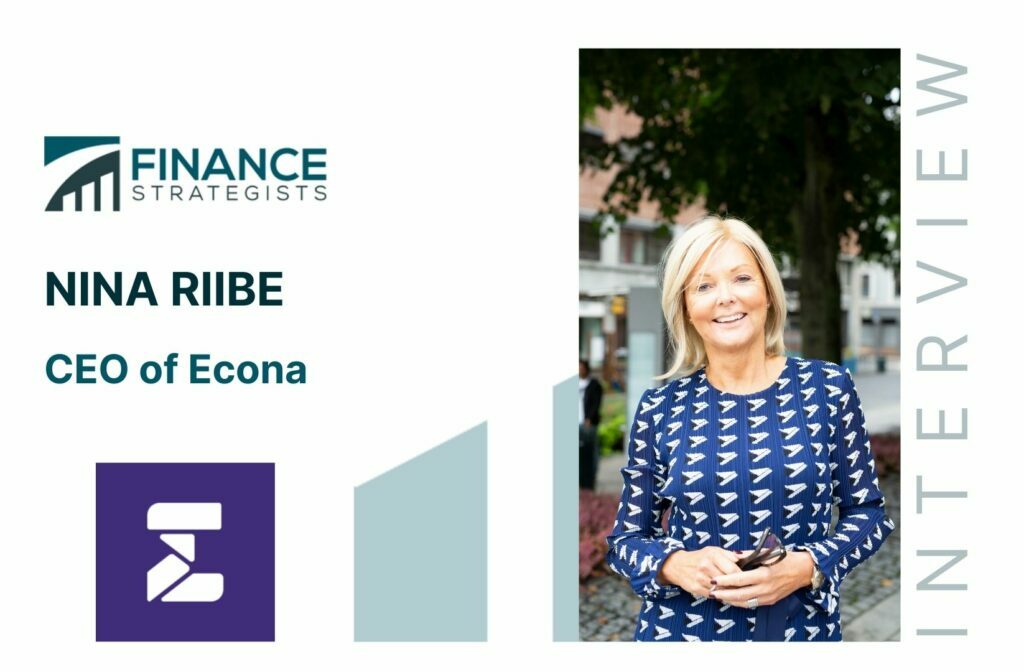Success leaves clues. Finance Strategists sat down with Nina Riibe of Econa. She shared her thoughts on the past, present, and future of the company, as well as insight gained from running the business. Q: Who are you and what’s your background? I grew up in Tønsberg, a small town in Eastern Norway, born in 1967. My MsC (Economics) is from University in Karlstad, Sweden. I have long experience in commercial and communication leadership, and love to make employees head for the same direction, build talents and lead the business to higher goals. Q: Who has been your biggest influence, and why did they have such a significant effect on you? First, I would like to mention my grandmother. When she was born in 1910, it was not obvious that women could work outside of the home. She was accepted for nursing school and got married. But her husband did not want her to get the education nor a nursing career. From when I was a teenager she always told me that the most important thing to do, as a woman, is to be able to provide for myself and not be dependent on a man financially. This has always been part of my DNA. She is the first one who really influenced my choices/decisions. After some years with Arthur Andersen and Chivas Whisky I started working for ISS, a global facility management business. The CEO back in those years, Mr. Torbjørn Graarud, believed in me. He trusted me, but also encouraged me to find my potential to be a leader. From that time on I became more and more ambitious about being a leader. I got the necessary confirmation I needed to take those steps. In recent years, a most profiled, outspoken and disputed man, Mr. Hans Geelmuyden, chose to hire me just after a deep crisis, from both a business and personal aspect. Mr. Geelmuyden took the chance and hired me. He saw my potential. That turned into seven awesome years, and I became a leader of the business for the last 3 years. The fourth person is one who I have admired for his leadership skills. For 13 years he was CEO of Norway’s leading and largest bank, DNB. Rune Bjerke retired from this position 3 years ago, but still takes board positions and gives lectures. I admire him for his transparency and for not trying to hide behind mysterious terms and complexity. He is a leader who really invests in people to encourage development. The results, not just the financial, but from innovation (most known is VIPPS), DNB as an employer and a company which gave “braveness” a new meaning and inspired a lot of other leaders. I have to mention one decision in particular. He made some bold choices and one was to put a goal of 40% female heads of the group management on his KPI card. He was the first CEO in Norway to say this out loud. Wow! Mr. Bjerke is superior when meeting all kinds of people. Today he is also my mentor. Q: Knowing what you know now, what advice would you give your younger self? Thinking back, I was very eager to head forward in my first years of work after study. I was keen on new companies, new branches. Reflecting over this now, I may have stayed a little longer in some of the companies and learned more from different areas and the overall business. I was mainly working for large companies, with many possibilities. Instead, I wanted to broaden my horizon and move further, maybe too fast. Q: What is Econa? Econa is The Norwegian Association for Masters of Science in Business Administration and Economics, and others with a master's degree in fields related to management, business, and economics. Established in 1939. Some 28,000 members incl. 4,500 students. There are 38 employees at our headquarters in Oslo. We have fourteen boards located in the largest cities in Norway, counting some 110 people who devote their spare time to Econa. Our aim is to be a lifelong career partner for our members, secure a fair salary and employment conditions for our members, and secure high standards in educational institutions within the field of business. We also motivate members to engage in questions related to society from an economic perspective, as well as humanistic and cultural issues. Many of Econa's members hold key positions in organizations, which gives them important power to influence decisions in various settings. Econa will take an even stronger position in relation to sustainability, and we aim to work closer with our members to increase knowledge on how to use sustainability to achieve growth, innovation, and profitability. We as an organization have the power, strength, and size to make a difference. In addition to this, we have many young members who are in management positions, and they are ready to make decisions. Q: What led you to start Econa? The ambition to make more people know what Econa is, among businesses, politicians and economists, was the most important attraction for me. The most important factor when I was invited into the recruiting process, was to make a difference for everyone with higher economic education in Norway. Q: What has the experience of building the business taught you? It’s all about people. Q: Where do you see things headed for you and the company in the next 5 years? Today we experience a serious climate crisis. We are just at the beginning of the fourth revolution, where the Green transition, Artificial Intelligence and Digital infrastructure are the main drivers. There are large global companies which establish their businesses in Scandinavia. These factors will influence work conditions and work life. Scientists state that Norway is one of the countries which is best prepared to implement this huge transition. Highly educated people are relatively cheap in Norway compared to other countries. Anyhow the most important factor is that we have been developing a well-functioning work life for years. In Norway we have a 3-party cooperation, that secures a healthy cooperation between employee organizations, employer organizations and authorities. Healthy work conditions do not come to life by themselves, this is something we have to value and work for every day. We need to ask ourselves: what kind of work life do we want for our children? Maintaining a healthy work life is our duty, and the foundation for this is the Nordic model with the three part cooperation. For the employees of today and tomorrow. Economists can either become more relevant in the future, or they will be less relevant. Econa’s prime goal is to make economists MORE relevant. And we have a lot in the making to make that happen. For more information, visit nye.econa.no
Introduction
Who is Nina Riibe?
Business

True Tamplin is a published author, public speaker, CEO of UpDigital, and founder of Finance Strategists.
True is a Certified Educator in Personal Finance (CEPF®), author of The Handy Financial Ratios Guide, a member of the Society for Advancing Business Editing and Writing, contributes to his financial education site, Finance Strategists, and has spoken to various financial communities such as the CFA Institute, as well as university students like his Alma mater, Biola University, where he received a bachelor of science in business and data analytics.
To learn more about True, visit his personal website or view his author profiles on Amazon, Nasdaq and Forbes.











